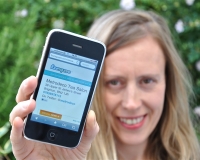Is Foursquare the right social technology for IFAs?

I have to admit, I’ve always been a fan of the location-based app Foursquare. My fiancée uses it at her tea shop to drive business, generate word-of-mouth marketing and to grab some publicity when she can.
In my last role as head of media at Brighton & Hove City Council, I helped organise the public sector’s first Foursquare Day to boost visitor number to libraries.
So it was with genuine excitement that I read this morning that Philip Calvert, front man for the social network for independent financial advisers IFA Life, had formed a partnership with the app.
For those who don’t know what Foursquare does, it allows users to ‘check in’ using smartphones when they visit any location – swimming pool, office, church (yes, there are churches on Foursquare), launderette or even the park bench.
When they do this, their friends and followers on Facebook and Twitter are alerted to this fact – and the idea is that, potentially, they might be interested in the venue themselves. Users win virtual badges (for example the ‘swarm badge’ when they check into a venue where there are at least 49 others checked in) making it part social network, part game.
The best-known accolade in the game is being ‘mayor’ of a venue – or the user who has checked in most times over a 30-day period.
The application uses a mobile phone’s GPS locator to work out its location and tells the user what Foursquare venues are in the immediate vicinity.
Users can see if friends have checked in near them and get suggestions on things to do where they are.
The possibilities for businesses are mind-boggling. For a start, like any reviewing/rating sites (Yelp etc) Foursquare allows people to leave positive or negative comments about you. Effectively, the entry for your business is an endlessly updating entry in an endlessly updating guide book to your locality. Not only can you learn from these comments and improve your service but, crucially, you can interact with those who have left them.
More sophisticated businesses will look at the activity and valuable opinions of visitors to similar businesses (ie the competition!) and even introduce themselves in a spam-free way.
Finally, the game element gives businesses a brilliant opportunity to attract customers by giving Foursquare users an incentive to check-in to their venue. For example, Domino’s offers free pizza to ‘mayors’. These Foursquare offers are called ‘specials’ and they pop up onto a user’s mobile phone screen when he or she wanders into the vicinity or checks into a nearby venue.
The point of setting up an IFA conference or other event as a temporary venue on Foursquare is obvious. Having lots of IFAs checking in on one day could lead to lots of interest among their social networks about the event, its speakers and organisers and future events.
But I wondered how an IFA could apply these uses to his or her own business. Could he or she offer an incentive for people to check in?
Do IFAs even see enough Foursquare users in a month to have any realistic chance of anyone ever checking in? My partner’s tea shop is a thriving business with 300+ visitors a week, yet they are lucky to get 10 check-ins in that time.
I tweeted Philip Calvert this afternoon to ask for his thoughts and he pointed out that this partnership was less about checking in and more about giving people the ability to leave meaningful tips on their Foursquare page.
He also directed me to an article he wrote for Money Marketing last year, explaining very eloquently how location-based social networking could benefit IFAs.
And on IFALife.com, Philip makes the good point that some IFAs don’t have websites and this is a chance for them get a web presence and to give them a chance of turning up in search results for “IFA” + “locality”.
Facebook and blogs are, of course, better solutions to this problem.
While Foursquare isn’t the best tool to help your business perform well in Google searches, it is a brilliant way to have constant references to your business spreading wildly and virally throughout the Twitternets, the FaceSpaces and the cyberverse.
This is why, at least in the view of this long-time user, the ‘check-in’ is everything.
The check-in is the action that generates the word of mouth when it is shared acros a user’s social networks. It is what makes your Foursquare page live and forever updating. It is what gives you a presence continually in the social web without really ever having to do anything.
If IFAs or any other interested people out there have a view, then let me know in the comments section below.
For information on how to obtain a listing on IFA Life’s Foursquare page, visit http://www.ifalife.com/Foursquare
Michael Taggart (here on Twitter) is a head of digital an social at MRM and blogs at http://michael-taggart.com
